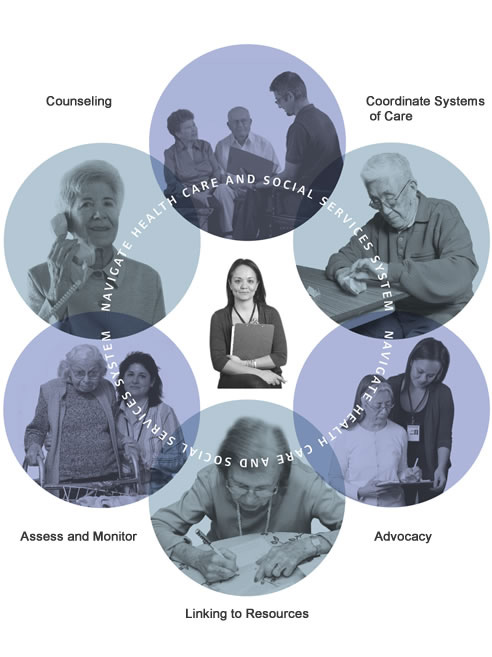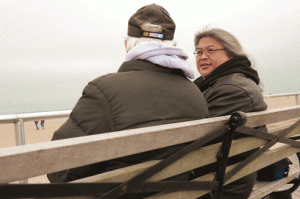In our 2009 Annual Report, we focus on a traditionally under-recognized field: social work. Social workers’ unique training, which naturally includes care coordination and treatment of individuals in the context of their families and communities, is particularly well-suited to helping older adults live richer, healthier lives. Despite this, geriatric social work languished for years behind other specialties, such as child welfare, mental health, and substance abuse. That cannot continue if we are to meet the health needs of our rapidly increasing older adult population. At some point in their careers, most social workers will be working with older people. That is why the John A. Hartford Foundation wants to ensure that all social workers receive some training in working with older adults.
 Back in the 1980s when I was working on my master’s degree, very few schools offered programs in aging. Over the last 10 years, however, social work students and faculty have enjoyed a growing number of opportunities to learn about aging through the Hartford Foundation’s Geriatric Social Work Initiative (GSWI). Launched in 1999, GSWI employs multiple strategies to increase the number of geriatric-specialized social workers as well as to include geriatrics in the training of all social workers. We are pleased to celebrate the 10th anniversary of this program in our 2009 Annual Report, which discusses the initiative and its component programs in depth and also offers insight into how geriatric social workers can improve older adults’ lives.
Back in the 1980s when I was working on my master’s degree, very few schools offered programs in aging. Over the last 10 years, however, social work students and faculty have enjoyed a growing number of opportunities to learn about aging through the Hartford Foundation’s Geriatric Social Work Initiative (GSWI). Launched in 1999, GSWI employs multiple strategies to increase the number of geriatric-specialized social workers as well as to include geriatrics in the training of all social workers. We are pleased to celebrate the 10th anniversary of this program in our 2009 Annual Report, which discusses the initiative and its component programs in depth and also offers insight into how geriatric social workers can improve older adults’ lives.
The first component of GSWI, launched in 1999, was the Hartford Geriatric Social Work Faculty Scholars Program. It was founded in order to help train current social work faculty to become leaders in geriatric social work. Well-trained faculty dedicated to geriatric social work research and education are the foundation of any effort to influence social work training. However, we quickly realized that training current faculty was not enough. We also needed to foster leaders among the next generation of academic social workers. To that end, Hartford added the Doctoral Fellows Program the following year.
Creating a cadre of academic leaders in the field of social work is only the first step in helping geriatrics permeate the social work field. Transforming education is the next. In addition to supporting faculty, the GSWI makes grants to the Council on Social Work Education to infuse the social work curriculum with critically needed gerontology content to ensure that all social workers will have competency in caring for older adults. Currently, the National Center for Gerontological Social Work Education (Gero-Ed) includes resources to help faculty learn more about geriatrics and integrate geriatrics into their curriculum. The Gero-Ed Center also works with textbook companies and licensing organizations to ensure that aging is included in their books and tests as well.

Coursework in aging is a good foundation for social work students—but working directly with older adults is a much more powerful learning experience than reading about them in a textbook. In order to give more students hands-on experience with working with older adults—which can help dispel negative stereotypes about older people—Hartford created the Practicum Partnership Program in 1999, now called the Hartford Partnership Program for Aging Education (HPPAE). Currently active at 72 schools of social work, the program gives master’s-level social work students the opportunity to rotate through several field placements, such as health and social service agencies, senior centers, and nursing homes, exposing them to several different types of aging populations.
Having worked in aging services all my career, I know how important these programs are in providing training and education to social workers. I found the work to be extremely rewarding, and I know that social workers who take advantage of these opportunities to learn about aging by working directly with older people will be pleasantly surprised by the depth and meaning of their experiences.
In upcoming weeks, in celebration of GSWI’s 10th anniversary and the publication of our 2009 annual report, my colleagues and several guest bloggers will be exploring Hartford’s social work programs in greater depth, as well as considering how geriatric social work complements other health care fields as we strive to improve the care all older adults receive.
Other blogs in this series
- Reaching Out to Social Work Leaders by Corinne Rieder
- Beatrice by Rachael Watman
- Building the Student Pipeline by Nancy Kropf
- A Collaboration That’s Greater Than the Sum of Its Parts by Amy Berman
- Developing a Geriatrics-Trained Workforce by Tracy Schroepfer
